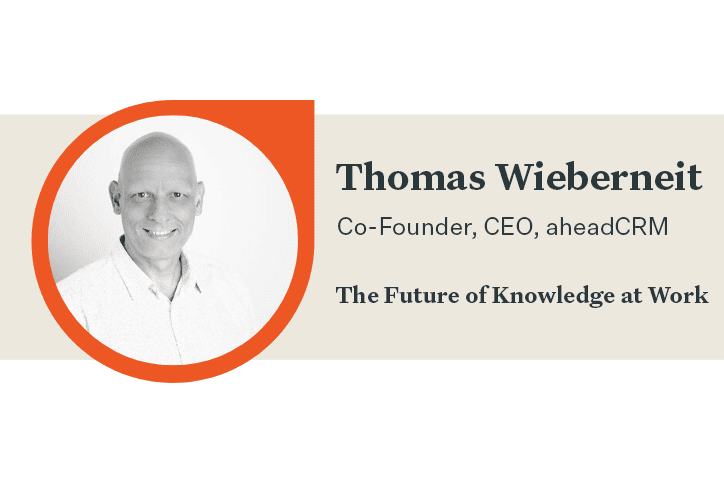Bloomfire Q&A: Thomas Wieberneit on Digital Transformation and a Culture of Knowledge Sharing

It’s no secret that digital transformation is a favorite topic for the Bloomfire team. Because we spend a lot of time thinking about the role knowledge engagement plays in digital transformation initiatives, we were interested in having a conversation with a digital transformation expert as part of our Future of Knowledge at Work interview series. We were fortunate enough to have the opportunity to interview Thomas Wieberneit, a customer relationship management (CRM) consultant who has over 20 years of experience leading digital transformation initiatives.
You can check out our conversation below.
Tell us a little about yourself.
I help organizations of different industries and sizes to unlock their potential through digital transformation initiatives using a Think Big – Act Small approach. I’m a long-standing CRM practitioner, covering sales, marketing, service, collaboration, customer engagement, and customer experience. Using my background in technology, I help translate business needs into technology solutions that add value. When I am not at work, I try to spend time with my wife and family.
How did you get started in your career as a CRM consultant?
I wish I could say that it was a plan. My career in the CRM industry started in 1995 with a sales force automation specialist named Kiefer & Veittinger, which got acquired by SAP, where I was charged with different roles in the CRM portfolio. From 2006-2008, I was heading the Montreal development team. From there I moved into the consulting side of the house, first for CGI and CIBER, then self-employed, and currently for valantic. I’ve had engagements in Canada, New Zealand, Australia, Russia, and the Middle East region.
What knowledge do you rely on most to do your job?
Being a computer scientist by education, I apply a lot of analysis and decomposition of problems. Throughout my career I was confronted with different types of business challenges and IT architectures and have found that experience can be substituted only by…more experience. Still, it’s very helpful to have some formal knowledge about systems architecture, enterprise architecture, and their intersection with business processes and, ultimately, the goals that shall get achieved with them. At the end of the day, it’s about combining different types of knowledge to tackle a business challenge.
Based on your experience through your consulting engagements, what do you think are the biggest knowledge management challenges facing business leaders (and how do you solve them)?
The single biggest challenge is corporate culture. If people are not encouraged to share knowledge but are stuck in a very old-school mindset of “knowledge equals power,” then they will not share knowledge at all. A sharing culture must be lived right from the top of the organization. From there on it boils down to ease–ease of retrieval as well as ease of adding data and information to knowledge bases.
From a technology point of view, this includes a complete (yet role-based) indexing of data, along with attribution and correlation of incoming data streams, so that you require as little explicit data capture as necessary. Then team members communicate through tools like Microsoft Teams, Slack, Chatter, or Zoho Cliq, which help make conversations searchable and therefore make experts identifiable. Of course, [knowledge management] solutions like Bloomfire have their place in solving this challenge, too.
Editor’s Note: Bloomfire integrates with both Microsoft Teams and Slack so that valuable knowledge shared in real-time conversations can be preserved in a company’s knowledge base, and information from a company’s knowledge base can be identified and pulled into real-time conversations.
Thoughts on how new technologies will impact the way business leaders manage and share their results?
In order to be successful, knowledge must be made accessible via the means that are best suited in context. Text will become less important and give way to more immersive media, including AR and VR. Engagement with the information will become more and more interactive.
What best practices would you recommend for capturing and sharing knowledge?
The first step is to make sure that the corporate culture actively supports knowledge sharing. Then make sure that the right tools are in place to collect, aggregate, attribute, and index data and turn it into knowledge. Instead of using email, communication needs to happen using tools that make conversations and knowledge searchable and make it easy to identify subject matter experts.
What do you think are the key ingredients of a successful digital transformation?
Not surprisingly, communication is one key ingredient. Digital transformation is a business transformation towards a more efficient way of making knowledge available and using it. Digital systems support this, but up to the moment when an AI itself is capable of creating knowledge out of data without human help, people will remain key drivers.
Another key driver is the business platform used. You can read my thoughts on platforms here, but a key part is that technology needs to provide a tight data integration, so that you have one single source of the truth at any time. This is the foundation for efficient, digitally-supported processes, which a digital transformation will ultimately achieve.
What’s one prediction you have for how the customer experience landscape will change in the next year?
In the next few years, man-machine interfaces, and also machine-machine interfaces, will become more and more ‘natural.’ First the communication with the machine will be more natural, including dialogues instead of commands and clicks. Information presentation will become more immersive, especially using augmented and mixed reality technologies. As a consequence, customer experience—and user experience as well—will become more consistent between offline- and online scenarios. The first steps, though, will be voice interaction. Chat- and voice- bots will mature and become nearly commonplace in the next 12 to 18 months.
Thanks for sharing your insights and predictions, Thomas!
If you enjoyed this interview, check out several other recent interviews from our Future of Knowledge at Work series:
Michaela Mora on Connecting Research and Combating Hubris
Overstock’s Kamelia Aryafar on AI, an Experiment-Driven Culture, and More
ChurnZero’s You Mon Tsang on Knowing Your Customers and Being Transparent

How to Build an Insights Engine: The People, Technology, and Culture You Need

How to Measure the ROI of Knowledge Management

How to Navigate the Chain of Command in Business to Get Executive Buy-in

Start working smarter with Bloomfire
See how Bloomfire helps companies find information, create insights, and maximize value of their most important knowledge.

Take a self guided Tour
See Bloomfire in action across several potential configurations. Imagine the potential of your team when they stop searching and start finding critical knowledge.